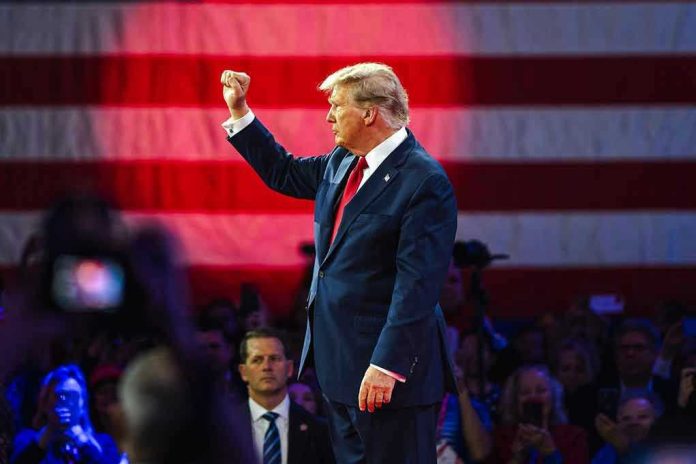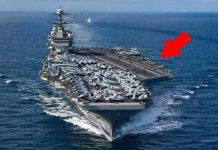
President Trump’s historic move to designate Saudi Arabia as a major non-NATO ally redefines America’s Middle East strategy, while putting constitutional values and American interests at the forefront after years of globalist drift.
Story Snapshot
- Trump formally recognizes Saudi Arabia as a major non-NATO ally during a high-profile White House ceremony with Crown Prince Mohammed bin Salman.
- Saudi Arabia pledges $1 trillion in new U.S. investments, marking an economic boost and deeper bilateral ties.
- The announcement signals a shift away from past “America Last” policies, reinforcing U.S. defense strength and energy security.
- Critics raise concerns about human rights, but supporters emphasize the strategic and economic advantages for American workers and families.
Trump Elevates U.S.-Saudi Alliance After Years of Policy Drift
On November 18, 2025, President Donald Trump welcomed Saudi Crown Prince Mohammed bin Salman (MBS) to the White House, announcing Saudi Arabia’s formal designation as a major non-NATO ally. This title, never before granted to Saudi Arabia, confers critical military and economic privileges without binding the U.S. to mutual defense obligations.
The decision follows decades of U.S.-Saudi cooperation, but marks a sharp turn from the indecisive, globalist policies of the previous administration. Supporters argue this move positions America to better counter threats from Iran and stabilize energy markets, protecting U.S. national interests and constitutional values.
Saudi Arabia’s new status comes as it pledges a historic $1 trillion in U.S. investments, targeting infrastructure, technology, and manufacturing. The agreement also opens the door for Saudi participation in the Abraham Accords, building on Trump’s earlier efforts to encourage regional normalization.
For American workers and industries, the influx of Saudi capital promises job growth, new contracts, and renewed energy security. The defense sector, in particular, is poised for expansion through joint exercises and advanced technology transfers, reinforcing U.S. military readiness without entangling the nation in endless foreign wars.
Strategic and Economic Rationale for the MNNA Designation
The major non-NATO ally designation, established in 1987, has historically been reserved for close U.S. partners such as Israel and Japan. It allows for strengthened military cooperation, priority access to U.S. defense technology, and streamlined economic partnerships. By naming Saudi Arabia to this select group, Trump seeks to lock in robust economic ties and ensure American leverage in a turbulent region.
This policy shift directly responds to years of globalist neglect and energy insecurity, prioritizing American prosperity, constitutional values, and national defense. Critics within Congress have questioned the move, but administration officials emphasize that it does not commit the U.S. to new wars or obligations, maintaining full respect for constitutional limits on executive power.
The announcement comes amid ongoing debates about Saudi Arabia’s human rights record, particularly in the wake of the Jamal Khashoggi murder. While some lawmakers and activists have voiced skepticism, the Trump administration justifies the decision as a pragmatic measure to advance American economic and security interests.
Energy market stabilization, countering Iranian aggression, and expanding the Abraham Accords are cited as key benefits that align with traditional conservative priorities. Analysts note that the $1 trillion Saudi investment pledge could jumpstart critical U.S. sectors, offering a tangible win for American families and communities long frustrated by inflation and lack of opportunity.
Regional Impact and Constitutional Considerations
The White House ceremony announcing Saudi Arabia’s new status signals a recalibration of Middle East policy rooted in strength and common sense. By prioritizing defense readiness and American jobs, the Trump administration aims to reverse the legacy of globalist overreach and unchecked spending. While human rights concerns warrant vigilance, supporters argue that closer U.S.-Saudi cooperation enhances regional stability and deters adversaries like Iran.
The move also reinforces America’s role as a constitutional republic: the MNNA designation expands strategic ties without compromising Congress’s war powers or undermining the Second Amendment, a key concern for conservatives wary of international entanglements.
As implementation details emerge, both nations are expected to deepen military and economic collaboration, with the U.S. retaining full oversight of arms sales and technology transfers.
The agreement’s economic dimension will provide a much-needed boost for American workers, further distancing the nation from the inflationary and regulatory excesses of the previous administration. The Trump White House has signaled openness to additional normalization deals in the region, leveraging the new relationship with Saudi Arabia to promote stability, energy security, and prosperity for U.S. families.
Sources:
Trump makes Saudi Arabia major non-NATO ally, boosting military, economic ties
Trump honors Saudi Crown Prince with major non-NATO ally status
Trump designates Riyadh as major non-NATO ally in renewed US-Saudi clinch
Analysis: Trump’s Saudi MNNA move cements partnership, raises questions











